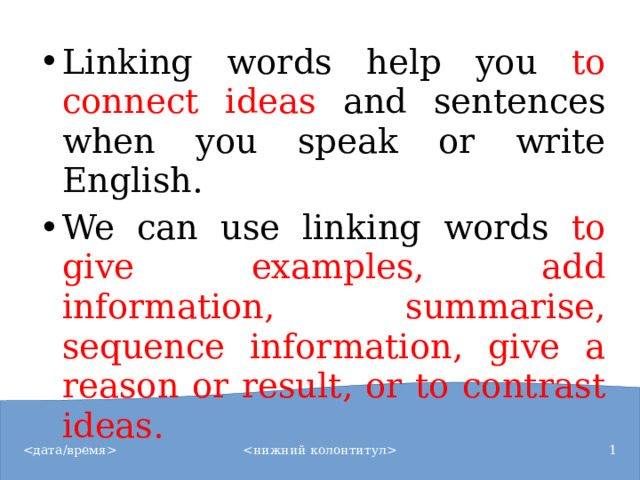
- Linking words help you to connect ideas and sentences when you speak or write English.
- We can use linking words to give examples, add information, summarise, sequence information, give a reason or result, or to contrast ideas.
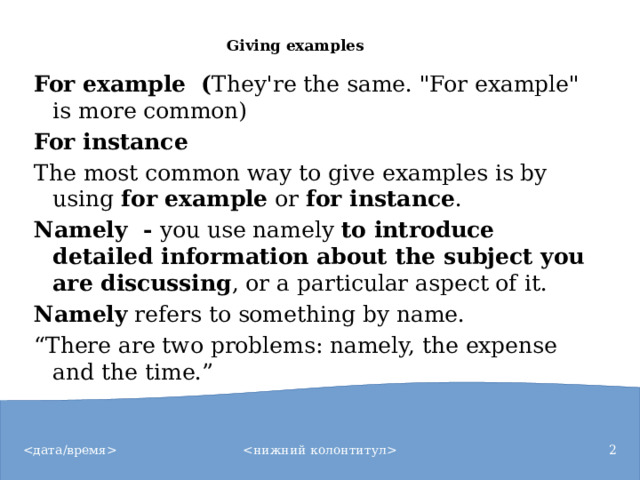
Giving examples
For example ( They're the same. "For example" is more common)
For instance
The most common way to give examples is by using for example or for instance .
Namely - you use namely to introduce detailed information about the subject you are discussing , or a particular aspect of it.
Namely refers to something by name.
“ There are two problems: namely, the expense and the time.”
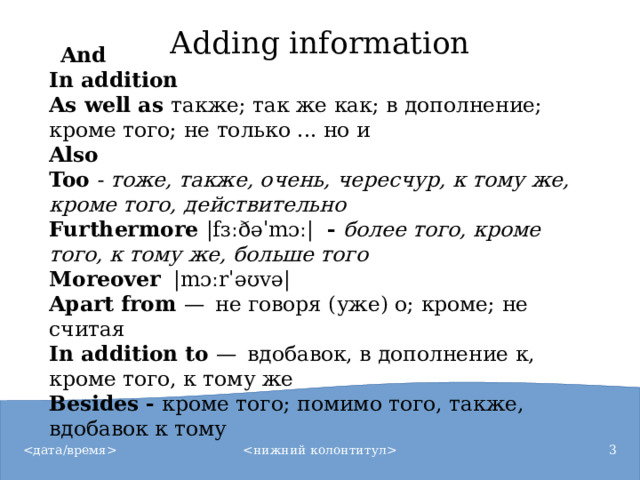
Adding information
And In addition As well as также; так же как; в дополнение; кроме того; не только ... но и Also Too - тоже, также, очень, чересчур, к тому же, кроме того, действительно Furthermore |fɜːðəˈmɔː| - более того, кроме того, к тому же, больше того Moreover |mɔːrˈəʊvə| Apart from — не говоря (уже) о; кроме; не считая In addition to — вдобавок, в дополнение к, кроме того, к тому же Besides - кроме того; помимо того, также, вдобавок к тому
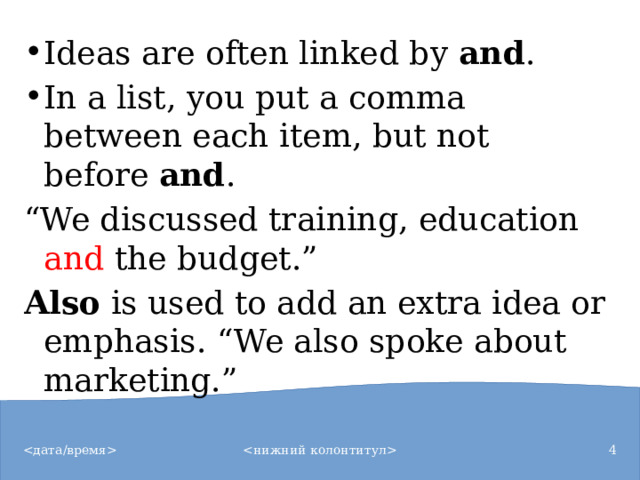
- Ideas are often linked by and .
- In a list, you put a comma between each item, but not before and .
“ We discussed training, education and the budget.”
Also is used to add an extra idea or emphasis. “We also spoke about marketing.”
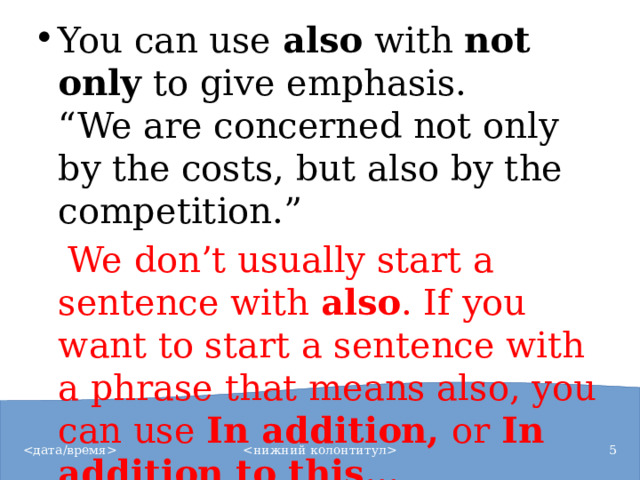
- You can use also with not only to give emphasis. “We are concerned not only by the costs, but also by the competition.”
We don’t usually start a sentence with also . If you want to start a sentence with a phrase that means also, you can use In addition, or In addition to this…
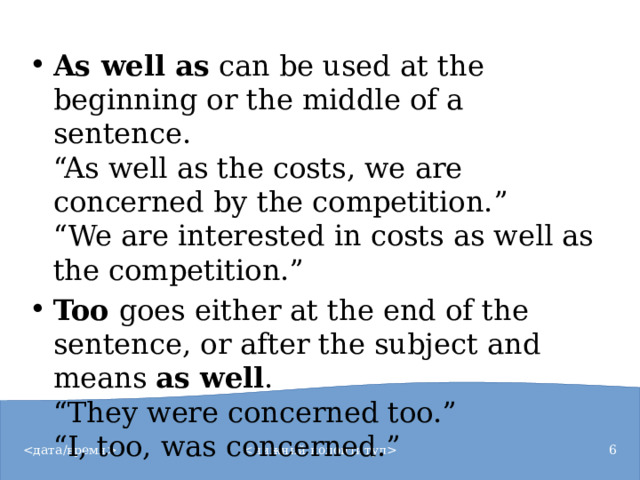
- As well as can be used at the beginning or the middle of a sentence. “As well as the costs, we are concerned by the competition.” “We are interested in costs as well as the competition.”
- Too goes either at the end of the sentence, or after the subject and means as well . “They were concerned too.” “I, too, was concerned.”
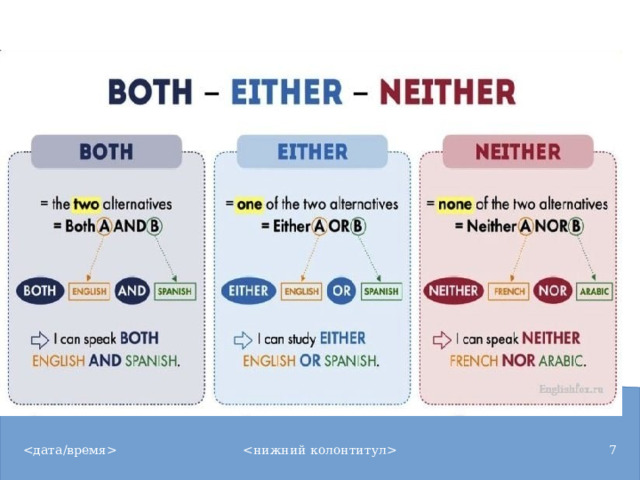
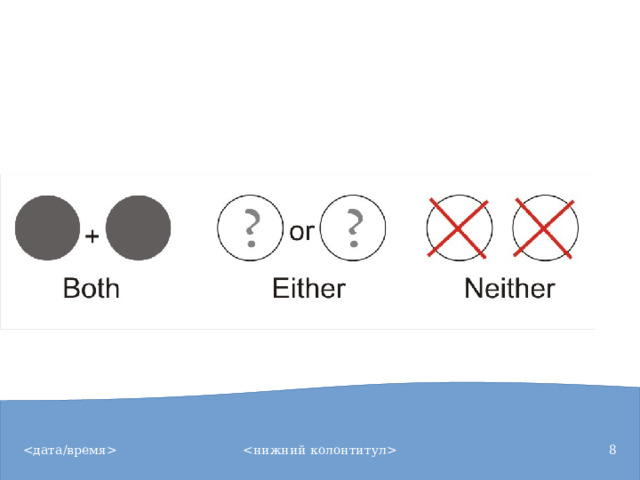
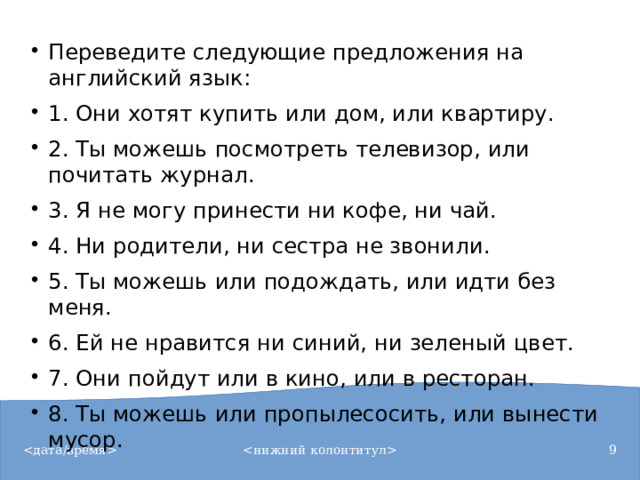
- Переведите следующие предложения на английский язык:
- 1. Они хотят купить или дом, или квартиру.
- 2. Ты можешь посмотреть телевизор, или почитать журнал.
- 3. Я не могу принести ни кофе, ни чай.
- 4. Ни родители, ни сестра не звонили.
- 5. Ты можешь или подождать, или идти без меня.
- 6. Ей не нравится ни синий, ни зеленый цвет.
- 7. Они пойдут или в кино, или в ресторан.
- 8. Ты можешь или пропылесосить, или вынести мусор.
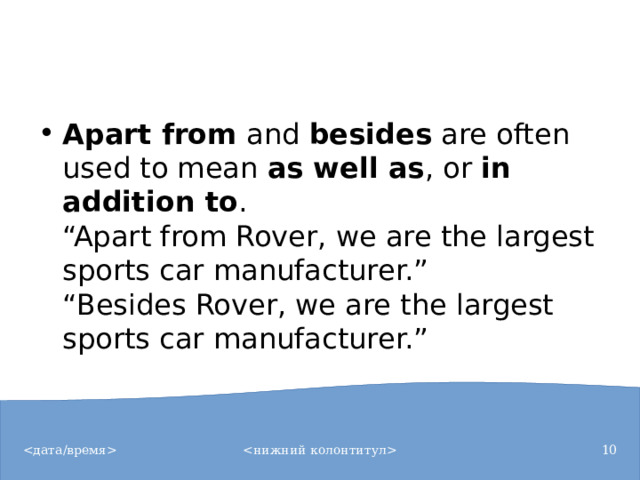
- Apart from and besides are often used to mean as well as , or in addition to . “Apart from Rover, we are the largest sports car manufacturer.” “Besides Rover, we are the largest sports car manufacturer.”
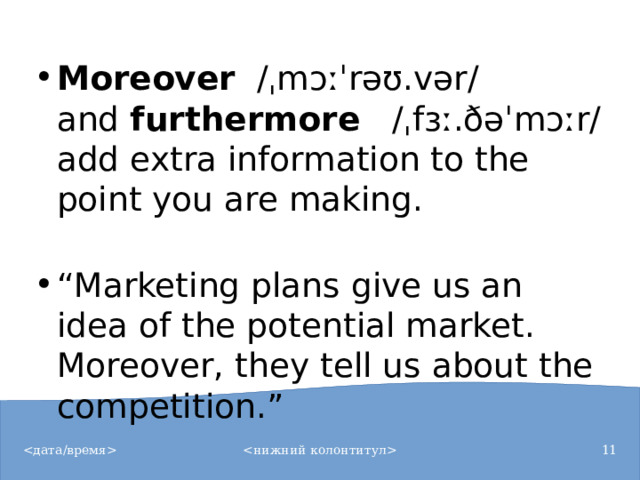
- Moreover /ˌmɔːˈrəʊ.vər/ and furthermore /ˌfɜː.ðəˈmɔːr/ add extra information to the point you are making.
- “ Marketing plans give us an idea of the potential market. Moreover, they tell us about the competition.”
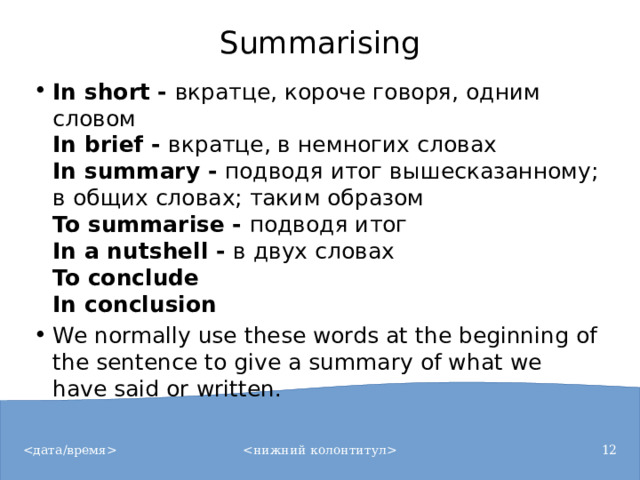
Summarising
- In short - вкратце, короче говоря, одним словом In brief - вкратце, в немногих словах In summary - подводя итог вышесказанному; в общих словах; таким образом To summarise - подводя итог In a nutshell - в двух словах To conclude In conclusion
- We normally use these words at the beginning of the sentence to give a summary of what we have said or written.
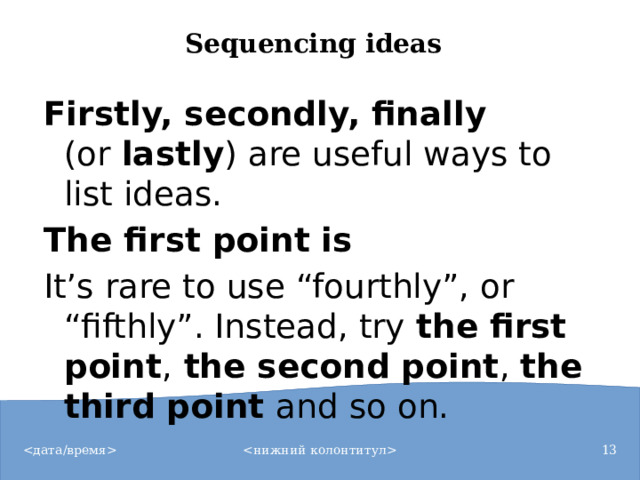
Sequencing ideas
Firstly, secondly, finally (or lastly ) are useful ways to list ideas.
The first point is
It’s rare to use “fourthly”, or “fifthly”. Instead, try the first point , the second point , the third point and so on.
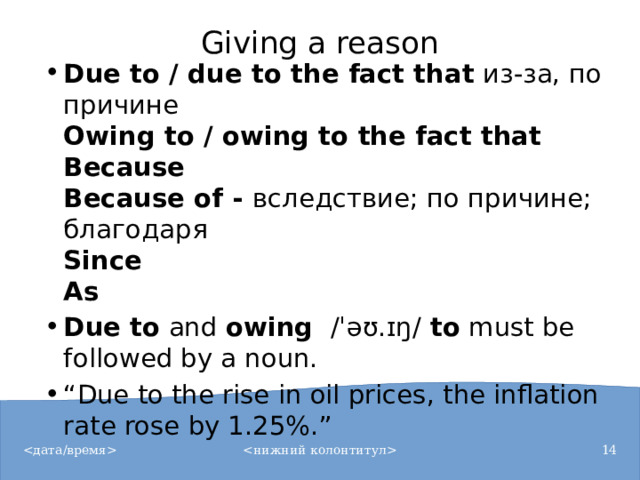
Giving a reason
- Due to / due to the fact that из-за, по причине Owing to / owing to the fact that Because Because of - вследствие; по причине; благодаря Since As
- Due to and owing /ˈəʊ.ɪŋ/ to must be followed by a noun.
- “ Due to the rise in oil prices, the inflation rate rose by 1.25%.”
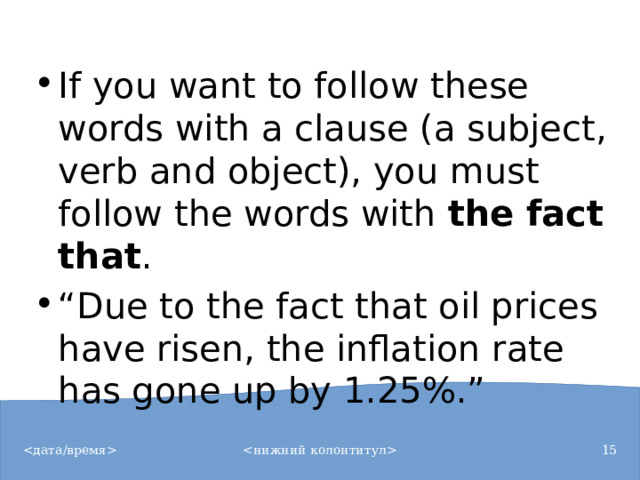
- If you want to follow these words with a clause (a subject, verb and object), you must follow the words with the fact that .
- “ Due to the fact that oil prices have risen, the inflation rate has gone up by 1.25%.”
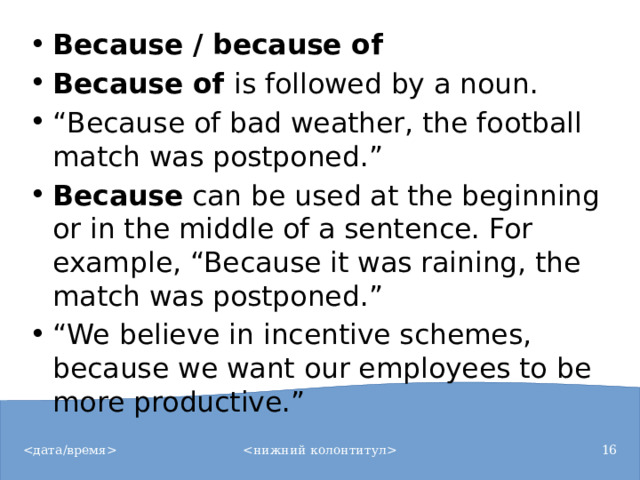
- Because / because of
- Because of is followed by a noun.
- “ Because of bad weather, the football match was postponed.”
- Because can be used at the beginning or in the middle of a sentence. For example, “Because it was raining, the match was postponed.”
- “ We believe in incentive schemes, because we want our employees to be more productive.”
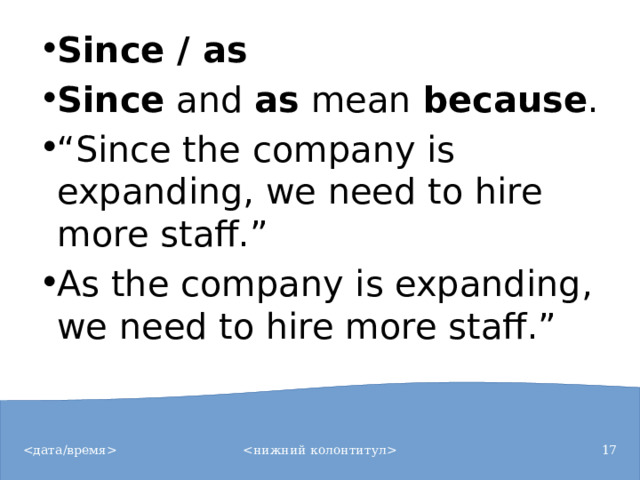
- Since / as
- Since and as mean because .
- “ Since the company is expanding, we need to hire more staff.”
- As the company is expanding, we need to hire more staff.”
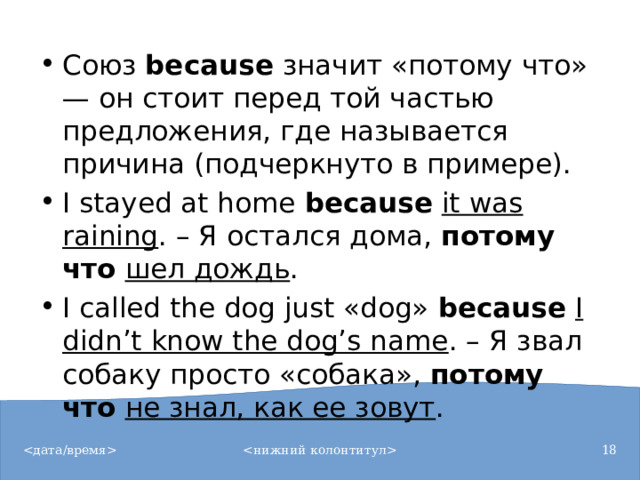
- Союз because значит «потому что» — он стоит перед той частью предложения, где называется причина (подчеркнуто в примере).
- I stayed at home because it was raining . – Я остался дома, потому что шел дождь .
- I called the dog just «dog» because I didn’t know the dog’s name . – Я звал собаку просто «собака», потому что не знал, как ее зовут .
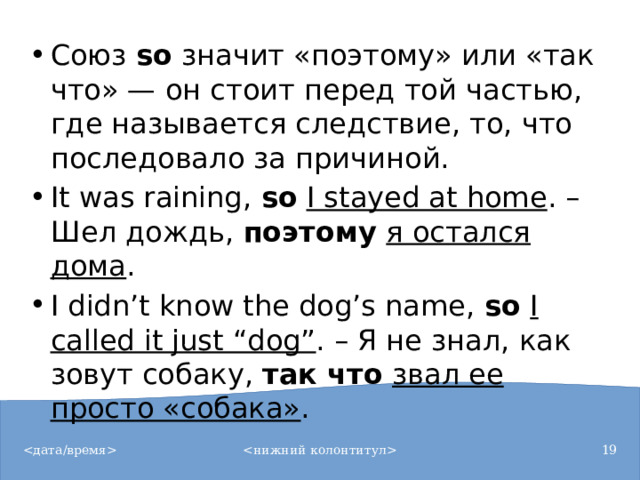
- Союз so значит «поэтому» или «так что» — он стоит перед той частью, где называется следствие, то, что последовало за причиной.
- It was raining, so I stayed at home . – Шел дождь, поэтому я остался дома .
- I didn’t know the dog’s name, so I called it just “dog” . – Я не знал, как зовут собаку, так что звал ее просто «собака» .
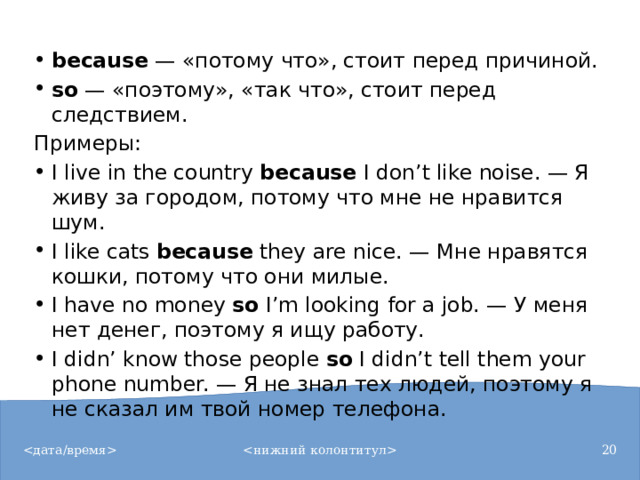
- because — «потому что», стоит перед причиной.
- so — «поэтому», «так что», стоит перед следствием.
Примеры:
- I live in the country because I don’t like noise. — Я живу за городом, потому что мне не нравится шум.
- I like cats because they are nice. — Мне нравятся кошки, потому что они милые.
- I have no money so I’m looking for a job. — У меня нет денег, поэтому я ищу работу.
- I didn’ know those people so I didn’t tell them your phone number. — Я не знал тех людей, поэтому я не сказал им твой номер телефона.
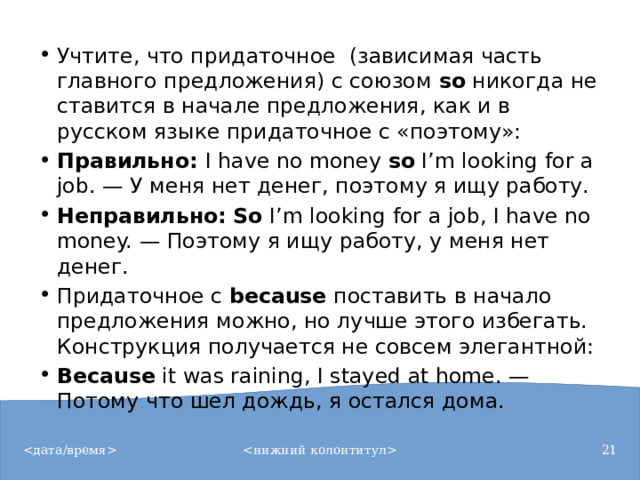
- Учтите, что придаточное (зависимая часть главного предложения) с союзом so никогда не ставится в начале предложения, как и в русском языке придаточное с «поэтому»:
- Правильно: I have no money so I’m looking for a job. — У меня нет денег, поэтому я ищу работу.
- Неправильно: So I’m looking for a job, I have no money. — Поэтому я ищу работу, у меня нет денег.
- Придаточное с because поставить в начало предложения можно, но лучше этого избегать. Конструкция получается не совсем элегантной:
- Because it was raining, I stayed at home. — Потому что шел дождь, я остался дома.
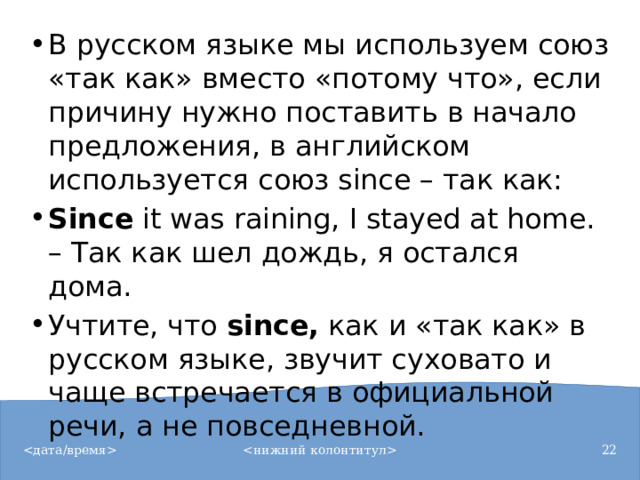
- В русском языке мы используем союз «так как» вместо «потому что», если причину нужно поставить в начало предложения, в английском используется союз since – так как:
- Since it was raining, I stayed at home. – Так как шел дождь, я остался дома.
- Учтите, что since, как и «так как» в русском языке, звучит суховато и чаще встречается в официальной речи, а не повседневной.
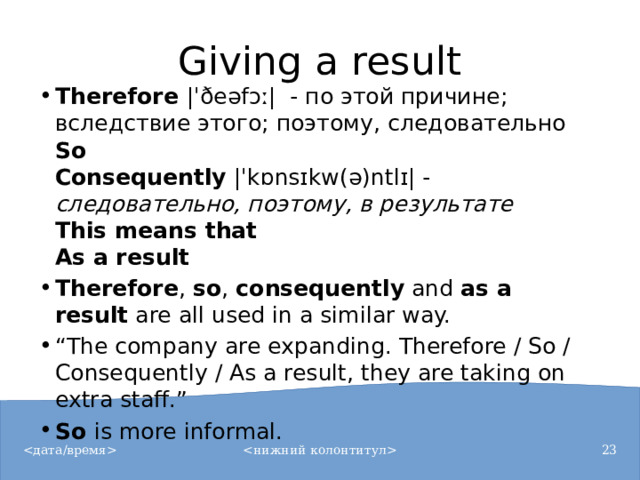
Giving a result
- Therefore |ˈðeəfɔː| - по этой причине; вследствие этого; поэтому, следовательно So Consequently |ˈkɒnsɪkw(ə)ntlɪ| - следовательно, поэтому, в результате This means that As a result
- Therefore , so , consequently and as a result are all used in a similar way.
- “ The company are expanding. Therefore / So / Consequently / As a result, they are taking on extra staff.”
- So is more informal.
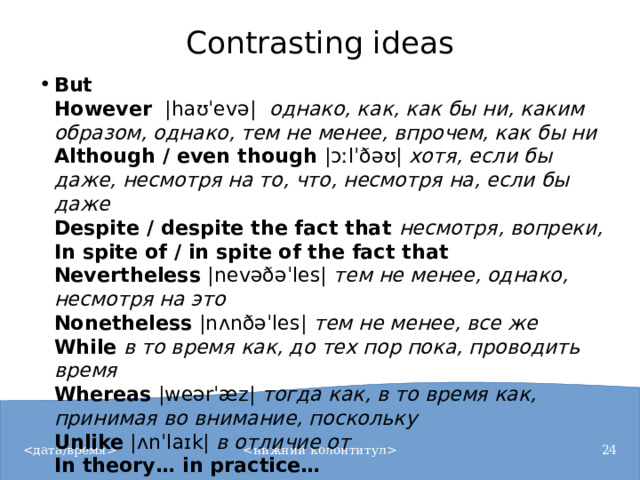
Contrasting ideas
- But However |haʊˈevə| однако, как, как бы ни, каким образом, однако, тем не менее, впрочем, как бы ни Although / even though |ɔːlˈðəʊ| хотя, если бы даже, несмотря на то, что, несмотря на, если бы даже Despite / despite the fact that несмотря, вопреки, In spite of / in spite of the fact that Nevertheless |nevəðəˈles| тем не менее, однако, несмотря на это Nonetheless |nʌnðəˈles| тем не менее, все же While в то время как, до тех пор пока, проводить время Whereas |weərˈæz| тогда как, в то время как, принимая во внимание, поскольку Unlike |ʌnˈlaɪk| в отличие от In theory… in practice…
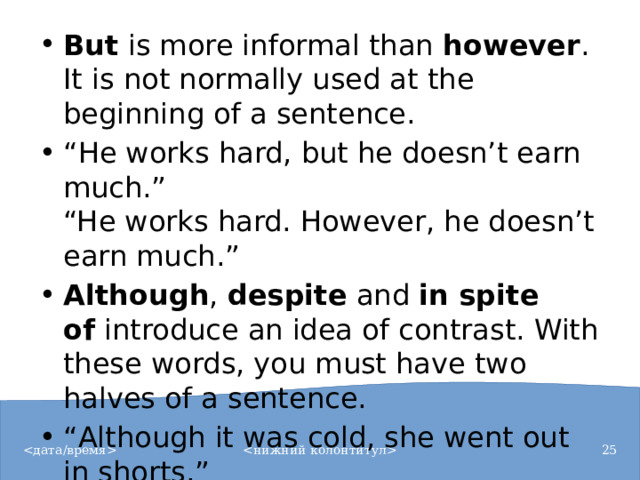
- But is more informal than however . It is not normally used at the beginning of a sentence.
- “ He works hard, but he doesn’t earn much.” “He works hard. However, he doesn’t earn much.”
- Although , despite and in spite of introduce an idea of contrast. With these words, you must have two halves of a sentence.
- “ Although it was cold, she went out in shorts.” “In spite of the cold, she went out in shorts.”
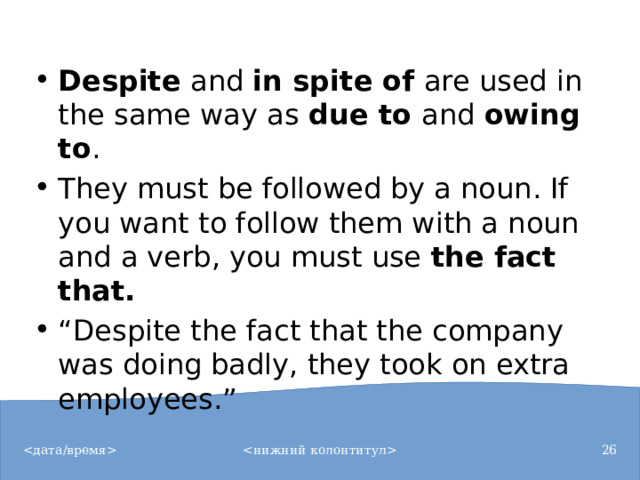
- Despite and in spite of are used in the same way as due to and owing to .
- They must be followed by a noun. If you want to follow them with a noun and a verb, you must use the fact that.
- “ Despite the fact that the company was doing badly, they took on extra employees.”
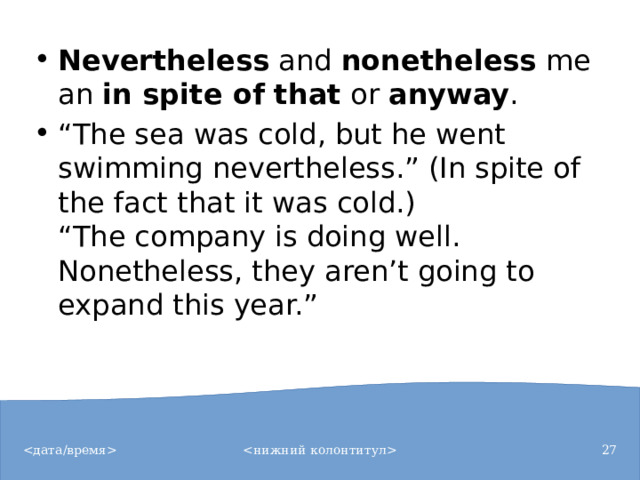
- Nevertheless and nonetheless mean in spite of that or anyway .
- “ The sea was cold, but he went swimming nevertheless.” (In spite of the fact that it was cold.) “The company is doing well. Nonetheless, they aren’t going to expand this year.”
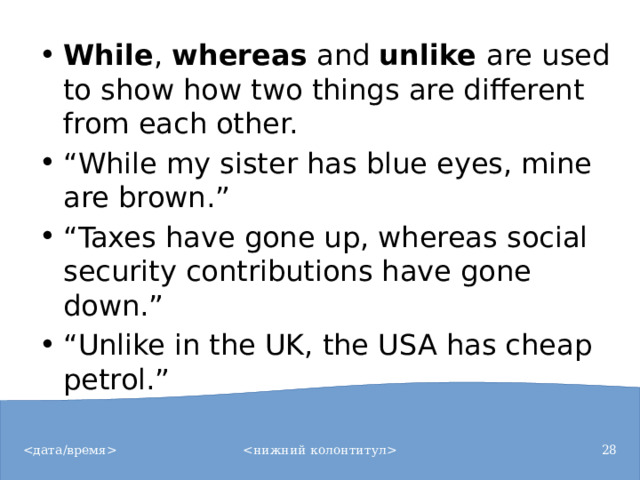
- While , whereas and unlike are used to show how two things are different from each other.
- “ While my sister has blue eyes, mine are brown.”
- “ Taxes have gone up, whereas social security contributions have gone down.”
- “ Unlike in the UK, the USA has cheap petrol.”
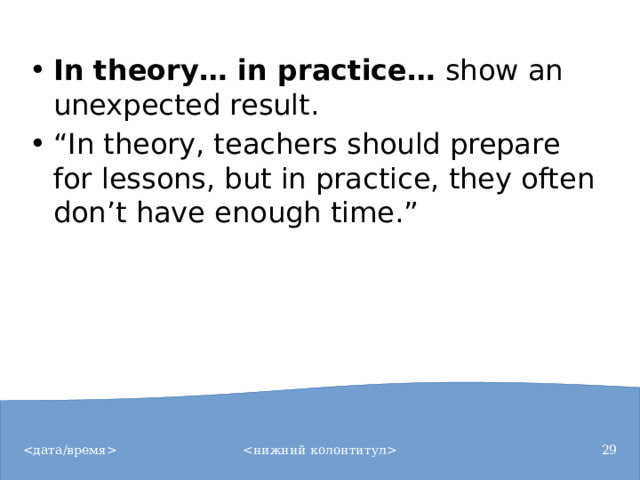
- In theory… in practice… show an unexpected result.
- “ In theory, teachers should prepare for lessons, but in practice, they often don’t have enough time.”
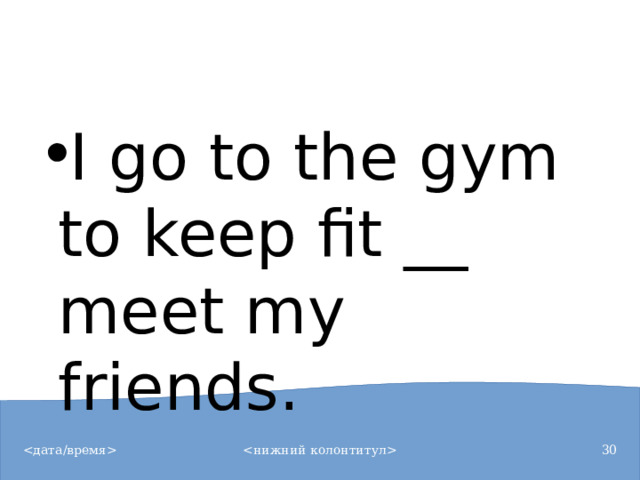
- I go to the gym to keep fit __ meet my friends.
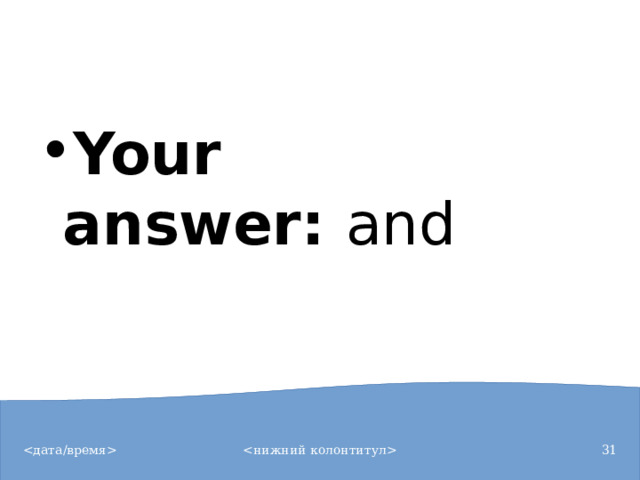
- Your answer: and
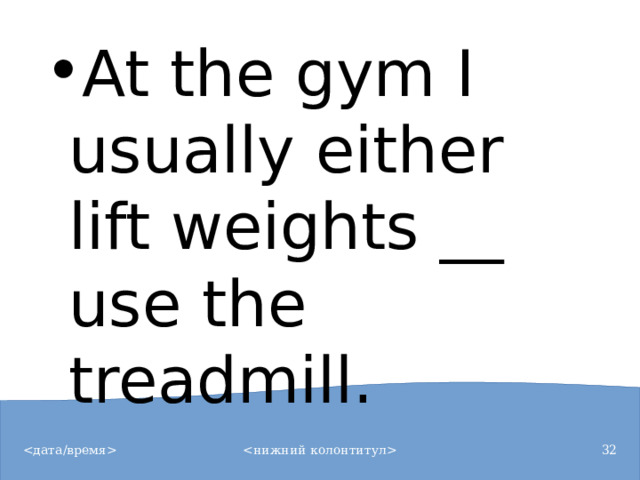
- At the gym I usually either lift weights __ use the treadmill.
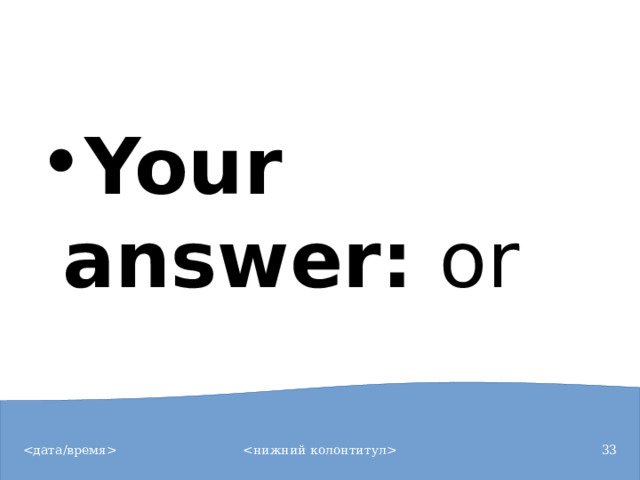
- Your answer: or
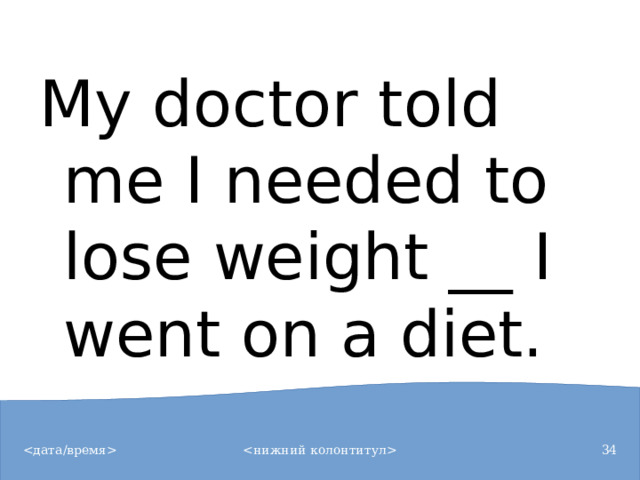
My doctor told me I needed to lose weight __ I went on a diet.
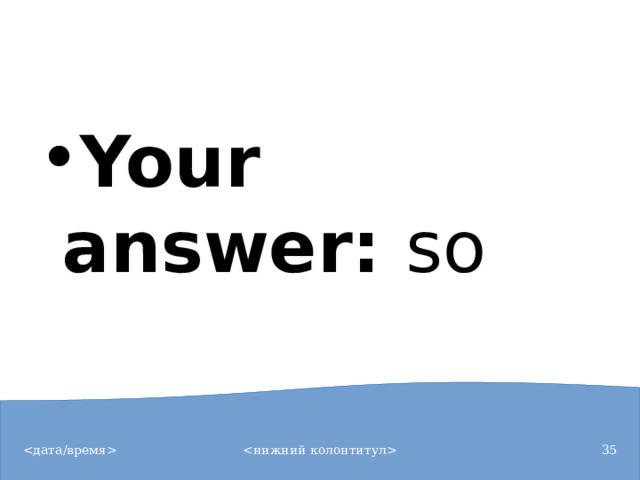
- Your answer: so
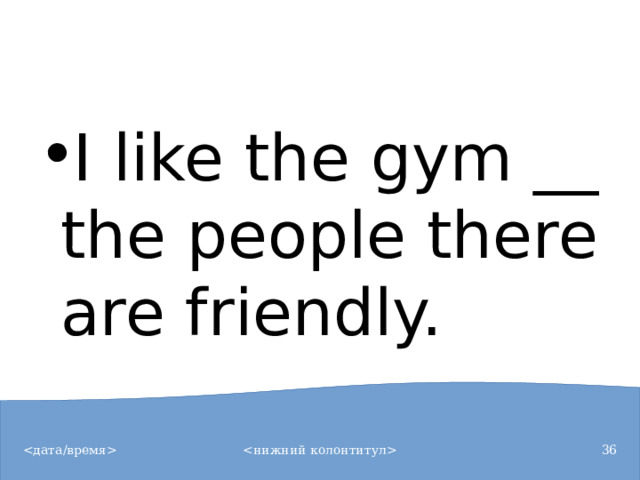
- I like the gym __ the people there are friendly.
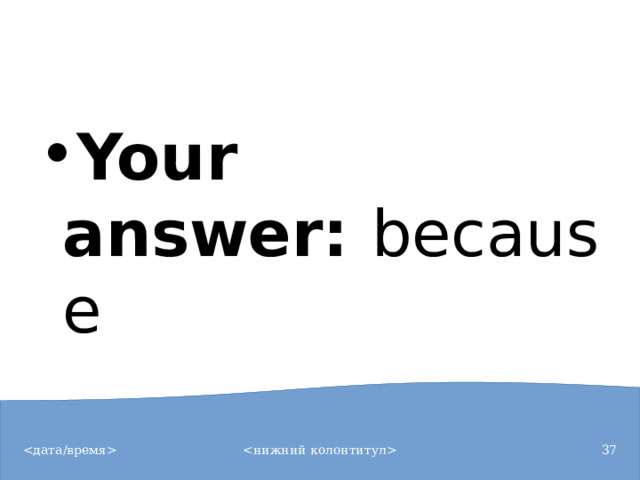
- Your answer: because
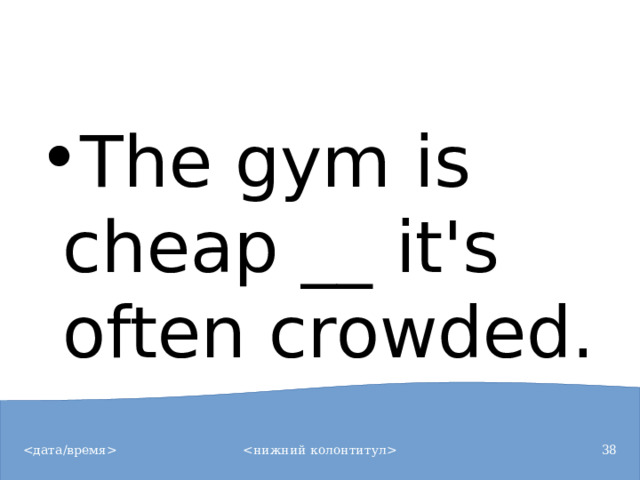
- The gym is cheap __ it's often crowded.
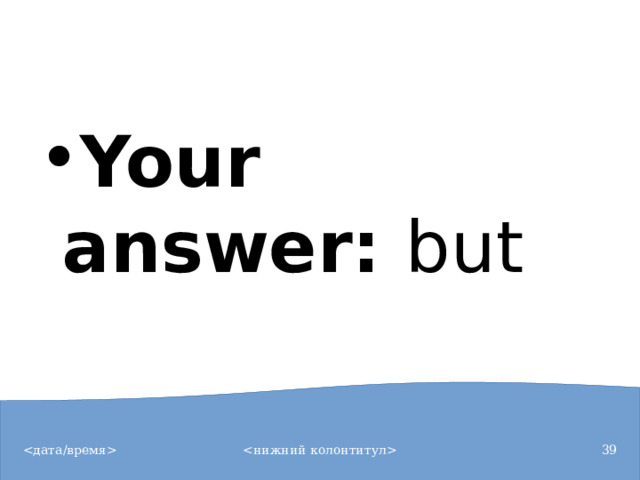
- Your answer: but
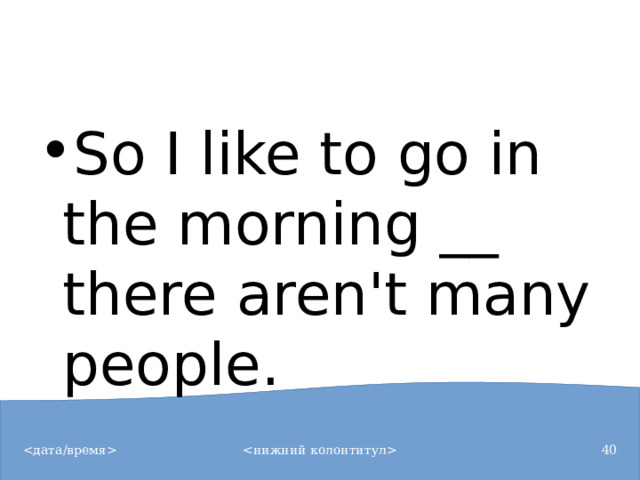
- So I like to go in the morning __ there aren't many people.
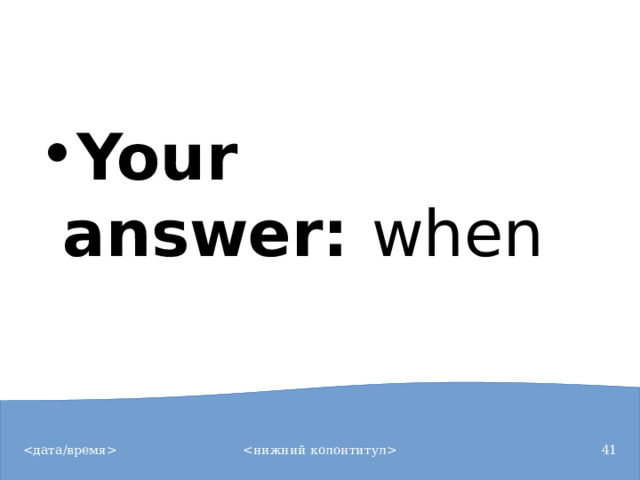
- Your answer: when
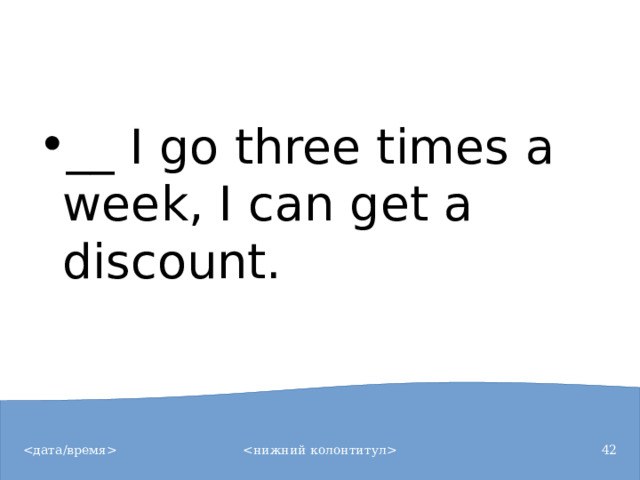
- __ I go three times a week, I can get a discount.
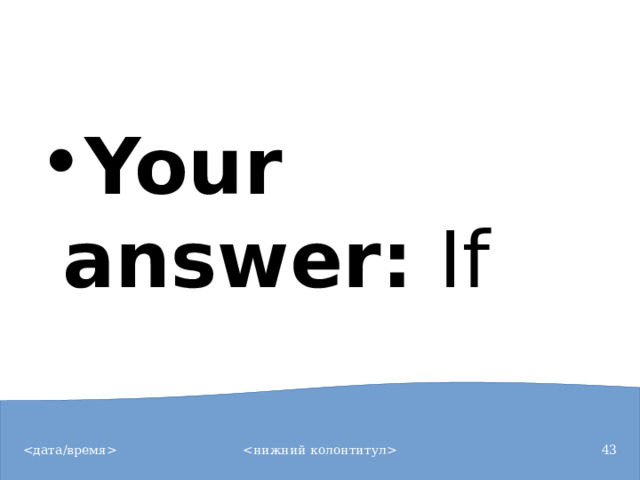
- Your answer: If
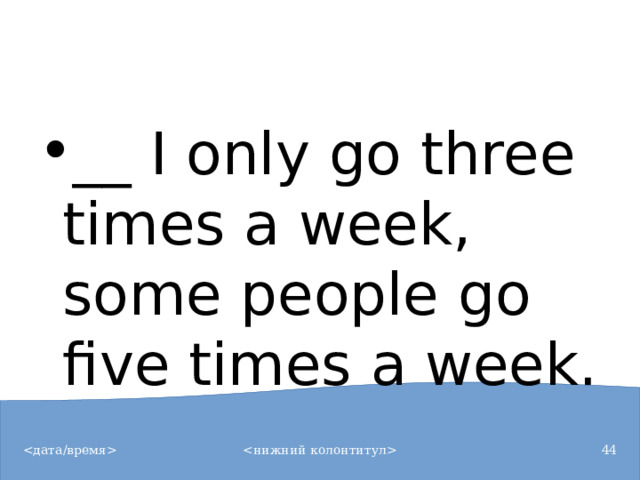
- __ I only go three times a week, some people go five times a week.
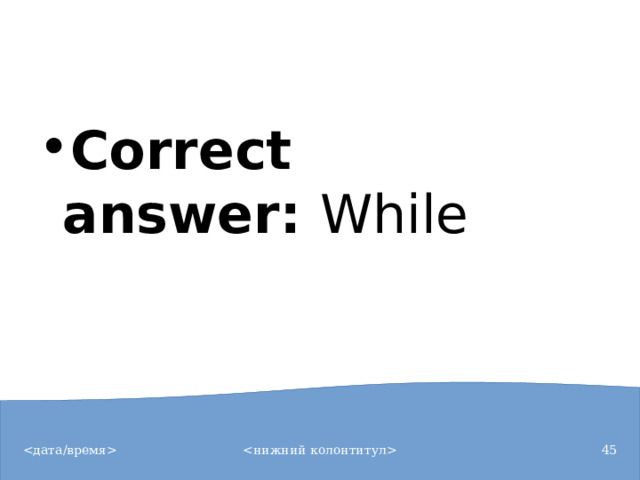
- Correct answer: While
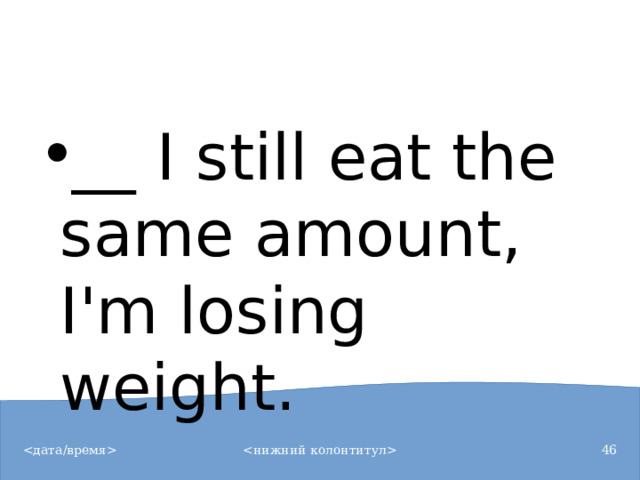
- __ I still eat the same amount, I'm losing weight.
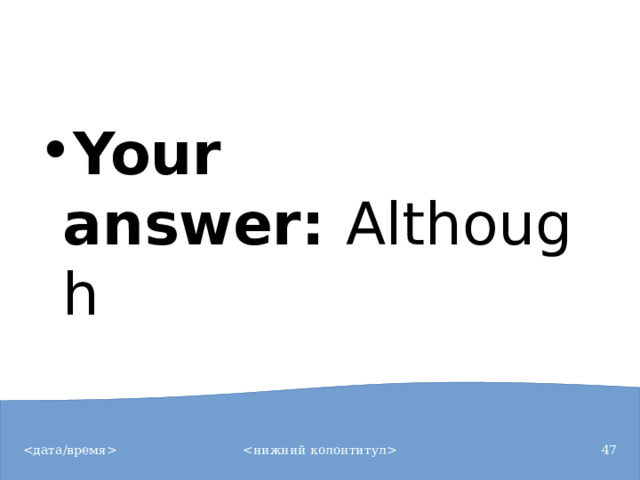
- Your answer: Although
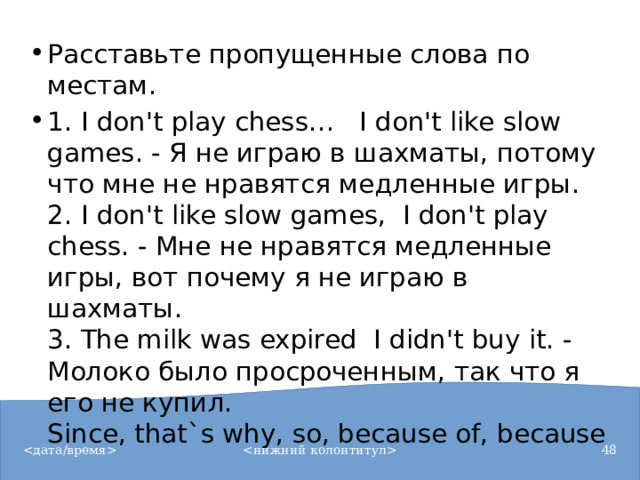
- Расставьте пропущенные слова по местам.
- 1. I don't play chess… I don't like slow games. - Я не играю в шахматы, потому что мне не нравятся медленные игры. 2. I don't like slow games, I don't play chess. - Мне не нравятся медленные игры, вот почему я не играю в шахматы. 3. The milk was expired I didn't buy it. - Молоко было просроченным, так что я его не купил. Since, that`s why, so, because of, because
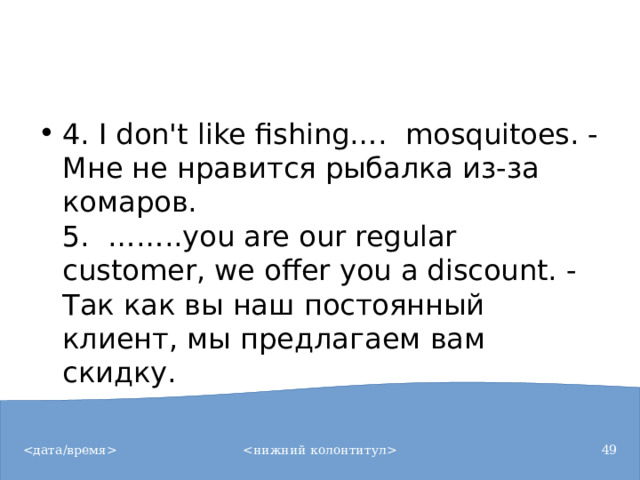
- 4. I don't like fishing…. mosquitoes. - Мне не нравится рыбалка из-за комаров. 5. ……..you are our regular customer, we offer you a discount. - Так как вы наш постоянный клиент, мы предлагаем вам скидку.





